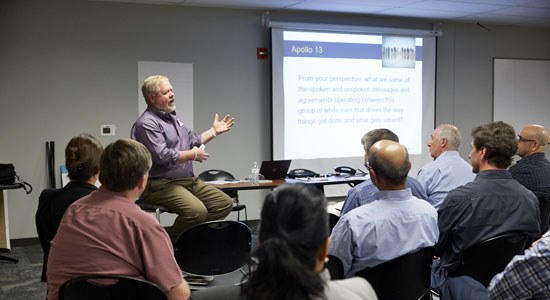Dermot O’Connell is the VP and GM OEM and IOT Solutions in EMEA at Dell recently attended Dell’s leader training, Men Advocating Real Change (MARC). More than 400 Dell executives and senior leaders, including Michael Dell, have completed intensive MARC workshops where they openly discussed workplace dynamics—especially related to gender—and examined the effects of their own unconscious biases. More than one quarter of Dell’s MARC participants were women, which enriched the discussion as leaders compared their personal perspectives. This is Dermot’s personal story of his experience with MARC.
Have you ever felt excluded from a group as if separated by a glass wall? You can see the group but you aren’t part of it. Well, it happened to me during a recent Dell MARC (Men Advocating Real Change) training session. We were asked a series of random questions about individual backgrounds and interests and, based on answers, we were categorised into groups and sub-groups. This went on until finally, as a tall Irish man, I stood alone on one side of the room. This exercise showed me how it felt to be excluded. Despite being a seasoned business leader, with experience in tough situations under my belt, I felt uncomfortable.
Men and women need to work together
For years, we have spoken about the glass ceiling, and the importance of diversity and equal female representation in the workforce. Huge effort has been expended, led largely by women and usually championed by human resources, in setting up female networking groups, hosting meetings, mentoring and sharing role model stories.
These efforts have made considerable headway, but MARC turns everything on its head. Rather than seeing diversity as a woman’s problem, it challenges the very system itself. Diversity is viewed as a business and social imperative that affects us all. Therefore, men need to be involved in any solution.
Questioning our subconscious prejudices
MARC challenges us to question our own hard-wired prejudices that we carry around subconsciously. They are by-products of our culture, age, upbringing, and accumulated experiences as well as media and other influences. Of course, you cannot change who you are—but you can be aware of this conditioning and take it into account in your behaviour and decision-making.
For example, you may have this idea that, for a particular role, you have to conform to a set formula as this is what has worked in the past. So you need to look a particular way, wear particular clothes, act in a particular way. You need to have gone to a particular university, and display particular characteristics. Is this real or just your bias at play? We have a tendency to find our comfort zone and select colleagues like ourselves, but we have to ask is that good for our business? Are we ignoring talent that could potentially be change drivers in our organisations?
I believe most people are coming from a place of good intention. Very few set out to deliberately hurt or offend. MARC training taught me that this acknowledgement of innocent intentions makes it easier to move from confrontation to discussion. The reality is that 99 percent of the time, when you challenge assumptions, you hear reactions like “I didn’t realise” and “I never thought”.
How have I changed?
So what difference has MARC made to me personally? Most importantly, it has made me more aware. I have asked myself tough questions. I continue to ask them every day and challenge my leadership team to do likewise. As a leader in a successful, multinational company, I realise that as a white male from a middle class family living in a first-world country, I have a responsibility to challenge the status quo and drive change. I don’t have to wait for other people to make changes—it can begin with me and, by extension, my management team and organisation.
For example, in my experience, sales roles across industry at all levels are usually heavily dominated by men. This is backed up by a Catalyst report, which says that the percentage of women in sales jobs stands at only 26 percent while the percentage of women managers (14 percent) is even lower.
In Dell, while we have happily succeeded in achieving a more evenly distributed sales team, I believe that there are still too few women in leadership roles. In response, we have introduced programmes that are making our workplace more inclusive not just for women but for all our employees. This includes work flexibility such as part-time working, different start and finishing times as well as working from home. As a result, we are seeing more women emerge in sales leadership roles.
Vive la différence
In terms of recruitment profiling, I am far more open in my thinking as to what constitutes a good candidate. Before I walk into the interview room, I stop and try to shed any unconscious biases that I may be carrying. I now actively seek diversity instead of sameness. I try to listen more and make a conscious effort to take on board different views. Instead of automatically opting for a team event that appeals to me, something I was guilty of doing in the past, we plan outings that are inclusive.
MARC has reminded me that people are different and that this is something to celebrate, something that is good for society, for business and the bottom line. Everyone brings something valuable to the table. Real diversity comes from creating an open environment where everybody feels included and valued, where you can express your views and are comfortable to do your best work.
I have a 14-year old daughter who believes she can be anything she wants to be. I hope she holds onto that feeling as she goes out into the world. We all deserve to be true to who we are without it affecting our success in the workplace.
I would love to hear your comments and am happy to answer any questions.
Dell’s MARC program is tied to our 2020 Legacy of Good goals, including our goal to increase engagement and drive inspirational leadership on Dell’s strategies, priorities and goals through Dell’s end-to-end Leadership Development Programs.

